Europe: The Old World Order
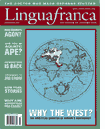
Lingua Franca, November 2001 The farewell issue, unless the mag finds new funding. … The cover story examines the many conflicting macro-historical explanations given for Europe's ascendancy. Some world historians chalk up European hegemony to its stumbling upon the New World; others, like David Landes, credit Europe's unique values. Still others say Europe wasn't unique at all until the coal revolution circa 1800. … A piece presents the long-derided Aquatic Ape Theory. According to the AAT, our hominid ancestors evolved many of their characteristic traits while wading through a flooded African habitat—not on some grassy savannah. Our hairless skin, uniform layer of fat, and down-turned noses (to facilitate diving) are among the many odd human features that make sense in light of the AAT. Now, after 30 years of mockery, the theory is beginning to be taken seriously by some anthropologists.—J.F.
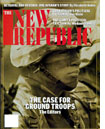
New Republic, Nov. 19 The cover story batters the Bush administration for its reluctance to put U.S. ground troops in Afghanistan. As Bill Clinton proved, you can't win a war from the air without an insurgent group on the ground—and thus far, the Northern Alliance hasn't proved capable. The Bushies have trumpeted the insertion of Special Forces troops, but these units should be corollary to, not a substitute for, a large ground force. Without one, the editors argue, the Taliban could hand the United States a "gratuitous and humiliating defeat."… A piece says African-American Muslims—ideally, a group that could explain the tenets of Islam to the American people—are unwilling or unable to denounce their Middle East co-religionists. Some have declared their support for Osama Bin Laden. But African-Americans who might denounce him find the media more interested in talking to members of the immigrant community.—B.C.
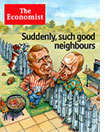
Economist, Nov. 10 A series of articles surveys the state of technology in the developing world. One piece touts genetically modified crops as the solution to feeding the world's poor. Another calls on First World governments to commit more public funding to fighting AIDS and tropical diseases in the Third World. And another piece says communication technologies have spread faster than expected in developing nations. … An article says Taliban profiteering keeps some parts of Northern Alliance territory from starvation. Taliban traders earn a handsome turnover carrying food staples across the front line to feed anti-Taliban cities whose other supply routes have been cut off by snow. … A piece notes the absence of jihad talk at the recent annual convocation of the Tablighi Jamaat (the proselytizing party that converted Cat Stevens) in Pakistan. The convocation is the second-largest Muslim gathering in the world (the hajj is first).— J.F.
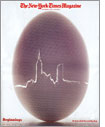
New York Times Magazine, Nov. 11
An issue filled with advice from New Yorkers about how to rebuild the city. … John Tierney suggests charging a per-block fee to every automobile that enters Manhattan, thus sticking it to affluent commuting suburbanites. Then return the money collected to the poor by reducing the city's sales tax. … Michael Lewis says the city should resist the urge to bring the financial community back to Wall Street. Financiers clustered in a few city blocks are, once again, easy targets. Instead, allow Wall Street to transform into a romantic residential neighborhood. … Slate's Jacob Weisberg thinks the city's priorities should be education and transportation, two areas that have stagnated or gotten worse over the last half-century. It's also time to re-imagine the city's 578 miles of mostly neglected coastline as commercial and residential real estate.—B.C.
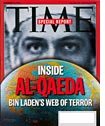
Time, Nov. 12 The investigative cover story analyzes Osama Bin Laden's al-Qaida network. Geographic mobility, especially since the weakening of European border controls, has facilitated the creation of a worldwide network, with numerous cells operating in the Philippines, Uganda, Germany, France, England, and the United States. Many al-Qaida members adhere to the Takfir wal Hijra ideology, "a sort of Islamic fascism." Takfiri terrorists adopt Western values to blend into the societies they infiltrate, which makes them nearly impossible to catch. … An article claims that the American military campaign is about to get nastier. Support for war is wavering among the European allies, and congressional critics from both sides of the aisle disagree with how it is being waged. The American public still approves of the bombing for now, and the Pentagon wants a dramatic victory soon to keep it that way.—J.D.
To try four issues of Time magazine for free, click here.
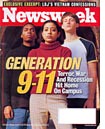
Newsweek, Nov. 12
The rah-rah cover story says that Sept. 11 shook college students out of their pre-professional frivolity and gave them a long-lost sense of public purpose. At the University of Michigan, kids once obsessed with pop culture and making money now are taking political science classes, attending teach-ins, and professing an interest in government service. Even frat boys seem "sober."… A piece describes the FBI's frustrating struggle with tips on possible terrorist activity. The bureau cannot effectively assess the credibility of new threats, and politicians keep leaking what information there is because they don't want to be blamed for the next attack. But Americans may become desensitized to the warnings if the government cries wolf enough. … A piece suggests that war is being fought on a political timetable. The Northern Strategy, which provides air support and supplies for Northern Alliance ground troops, protects America from serious casualties, but many military officials doubt the Northern Alliance is capable, and support of the rebel fighters undermines the Musharraf government in Pakistan.— J.D.
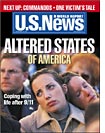
U.S. News & World Report, Nov. 12
The cover story describes how Americans are coping with Sept. 11 in their everyday lives. Psychologists see many more patients than ever, bartenders notice that singles are more likely to get together, caterers serve comfort food at house parties (to avoid public spaces), and Weight Watchers reports a surge in weight gain since the attacks. … A piece warns readers about the one terrorist weapon they don't worry enough about: the truck bomb. A number of Bin Laden associates in the United States attended driving school or obtained commercial drivers licenses and permits to haul hazardous materials. Hijacking a gasoline truck takes a lot less work than hijacking an airplane, even though they carry roughly the same amount of fuel. … An article reports that the Islamic American Relief Agency, a Missouri-based charity, may have ties to Bin Laden. The government has canceled $4.2 million in grants for the charity and considered freezing its assets because it provided funds for foreign groups that may bankroll terrorist activities.— J.D.
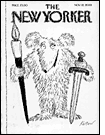
The New Yorker, Nov. 12
The cartoon special, focusing on Sept. 11 funnies. Best caption: "We're from the F.B.I., going from house to house making sure that everyone is scared shitless."... A remarkable article traces the Ames strain of anthrax from an outbreak in Iowa 50 years ago to a dead cow in the 1970s to a lab at Iowa State University to a U.S. Army lab, where the trail goes cold. Army researchers discovered that it was a particularly virulent strain and started using it for vaccination research, but its widespread use among scientists has made it nearly impossible to discover the provenance of the terrorist attacks.... A piece explores the divided loyalties of the huge Bin Laden family. Tied by business concerns to the West but by tradition to Islam and family, they are split between those who want to disown Osama and those who cannot bear to.— J.D.
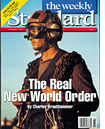
Weekly Standard, Nov. 12 The cover piece claims that Sept. 11 revealed the "utter bankruptcy" of Clintonian foreign policy. Clintonites spent eight years quixotically trying to form a new world order on paper by establishing treaties and international norms. But now a new world order involving unexpected global alliances has formed in reality, and it can only be maintained if America wins the war on terrorism. … An article says the United States should forget trying to find "moderate" Muslim fundamentalists who can be allies against terrorism, because none exist. Some thought Saudi Sheikh Yusuf al-Qaradawi could be just such a friend. On Sept. 27, he issued a fatwa obligating American Muslims to support their country and serve in its armed forces. But then two weeks later, he issued another statement. This one praised the Sept. 11 terrorists, condemned America, and incited Pakistanis against their government.— J.F.
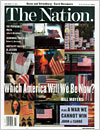
The Nation, Nov. 19 A piece belatedly wonders how well suited Tom Ridge is to be director of homeland security. As governor of Pennsylvania, he had a dismal record dealing with public health issues. And when it came to law enforcement and civil liberties, his thinking was anything but out-of-the-box. His new powers rest solely on his abilities as a kibitzing bureaucratic coordinator, which are not exactly the skills one cultivates as a governor. … An article explains how the democratization of media in the Arab world has made it tougher for countries like Egypt to take unpopular positions for the sake of their alliances with the United States. Whereas Egypt used to be able to steer popular opinion through its government-run TV station, now it must compete with Al Jazeera's purportedly un-biased, and often critical, broadcasts. … A piece requests that the term "The Street," which is used to characterize Arab popular opinion, be abandoned. It leads to oversimplified generalizations and is too-frequently employed in a racially condescending manner.— J.F.

